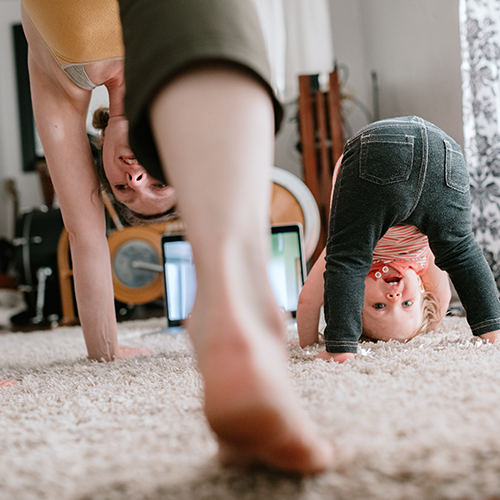We all know the feeling – we’re bored, we’re at home, we’re a little hungry… might as well go get a snack! But sometimes, all that snacking isn’t good for us.
At Children’s Minnesota, we want to help you and your family maintain healthy routines while being at home so much during COVID-19. Dr. Pamela Niksich, medical director of Children’s Minnesota, West St. Paul clinic, and Baylee Zittlow, nurse practitioner in the Adolescent Health Clinic at Children’s Minnesota, Minneapolis, give tips to maintaining healthy habits and routines while at home during COVID-19.
Maintaining healthy habits and routines
Healthy mealtime habits
Setting an example for your children during mealtime is really important. Kids often follow what their parents do – and even eat! For example, sit down at the table together for mealtime, and put distractions like TV and toys aside. This will help kids learn to make healthy food choices.
Also, if you create an eating schedule that stays the same most days, this will help kids and teens graze their food less and focus on mealtimes.
Finally, as a parent it’s important to control what is in your pantry. If you are going to purchase snack items, choose healthy snacks! Things like apples, bananas, string cheese are all good options. Try and limit items like chips, cookies and other junk food.
Healthy bedtime routines
It’s important for kids and teenagers to have healthy bedtime routines. Although, they may look a little different if the ages of your kids differ – here are just a few tips!
Tips for bedtime routines for kids
- Include a wind-down period in your bedtime routine, with dim lighting and a calm activity like reading or drawing.
- If your baby wakes at night to eat, it’s recommended to keep the lights low and resist the urge to talk or play. This helps send the message that nighttime is for sleeping.
- Establish an “electronic curfew” for your kids’ electronics. Electronics keep kids awake longer, so putting electronics away one hour before bed is recommended.
Tips for bedtime routines for teens
- Turn off electronics at least 30 minutes before bed. If you’re having trouble falling asleep, try reading a book or magazine instead of looking at your phone.
- Teens should try to go to bed at the same time every night, even on weekends, and wake up at the same time every morning, allowing for 8-10 hours of sleep.
- Use your bed just for sleeping — not doing homework, reading, playing games, or talking on the phone. That way, you’ll train your body to associate your bed with sleep.
- Make a morning routine as well! Even though not all teens are attending school in-person, it’s important to get up, shower, and get dressed for school just as they would if they were going to school.

Healthy exercise habits
Exercising and staying active are very important to everyone’s lives – including kids! One way to make sure your family stays active is to do fun activities together – like biking, walking, jogging, rollerblading, work outs at home, and so much more! Your child can join you in everyday activities like cleaning and gardening. “Being active together helps kids form a healthy habit by following your example,” said Dr. Niksich.
Recommended physical activity each day
It’s recommended that kids and teens get 30-60 minutes each day of physical activity. “I’ve really been encouraging teens taking a 20-30 minute walk each afternoon after school concludes, in order to get moving and get some fresh air after a full day of looking at their screens,” said Baylee.
Another fun idea for kids and teens: try and find at-home workouts on YouTube or TikTok!
Healthy screen time habits
As many kids are still learning virtually, it may seem hard to set healthy screen time routines for your family – but they’re important. According to the American Academy of Pediatrics (AAP), “By their teens, studies have found, kids spend nearly seven hours a day using screened-based media, watching TV, playing video games, and using social media.” And this doesn’t include school-time.
Baylee explains that kids and teens alike should spend no more than two hours per day on screen time outside of school work.
Finally, look at their posture. “Take a look at how your kids position themselves during screen time – poor posture can lead to headaches and other physical complaints,” said Dr. Niksich.

The best advice for healthy habits?
Baylee’s best advice for parents? Have their kids follow the 5-2-1-0 rule. Eat 5 fruits or vegetables, get 2 hours or less of screen time, enjoy 1 hour of physical activity and drink 0 sweetened beverages.